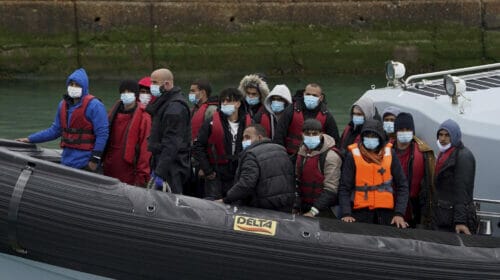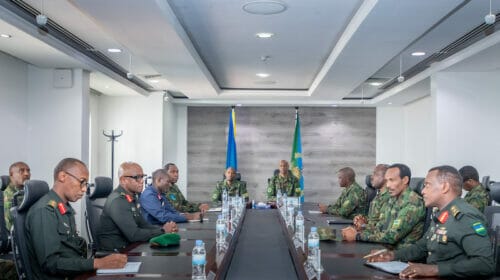How to end Rwanda’s PR problem
 The time has come for Kigali’s most powerful to make a loud and public cry for security for all Rwandans, even those who are critical of them.
The time has come for Kigali’s most powerful to make a loud and public cry for security for all Rwandans, even those who are critical of them.
As the festive season comes to an end and Valentine’s flowers begin to wither, the year’s first heavy rains have fallen on Kigali. I’ve spent just enough time here to know that the rains say one thing to most Rwandans: April is coming. And along with April comes “kwibuka” (commemoration or remembrance time) when many leave Rwanda but many more stay and join hands as the country goes into collective mourning for Rwanda’s darkest period—the 100 day span when approximately a million people were killed, many of them slaughtered in the streets or hunted down in places of refuge where they thought they would be safe.
Every year, the international community sends words of condolence to Rwanda for the 1994 genocide against the Tutsi. But these days, governments and human rights groups seem to be less interested in Rwanda’s tragic past and more interested in attacks on two or three of the country’s vocal critics. More attention is paid to one death than is given to the mass slaughter that occurred in 1994.
Rwanda’s breath-taking progress since 1994 is undeniable. The hard work of its people coupled with prodigious leadership by President Paul Kagame and a handful of his most trusted advisors has cemented Rwanda’s place as the African darling of the West and a favorite among development partners and investors.
Kagame seems to be in a good mood lately, and with good reason. His relationship with close neighbor Uganda has seldom been better, and an inquiry by French ballistics experts has essentially exonerated RPF operatives of being behind the downed plane of former President Juvenal Habyarimana. Moreover, an array of new poverty statistics released this month has shown that Rwanda is exceeding its own lofty 2020 targets by—among other achievements–lifting a million people out of grinding poverty in the last five years alone.
But watchful students of Rwanda know there is more to the story.
In late November, the United States Ambassador to the United Nations Susan Rice came to Rwanda for a visit. Rice gave a rousing six-page speech at the Kigali Institute of Science & Technology. She devoted most of her talk to Rwanda’s remarkable rebirth but saved the last page for criticism and suggestions for improvement.
Rwanda’s economic vitality has moved the country forward. Social progress has been substantial,” Rice told the several hundred people in attendance. “Yet, the political culture in Rwanda remains comparatively closed. Press restrictions persist. Civil society activists, journalists, and political opponents of the government often fear organizing peacefully and speaking out. Some have been harassed. Some have been intimidated by late-night callers. Some have simply disappeared.“
Officials in Kigali were livid when international media outlets covering the speech focused predominantly on those powerful words of caution near the end. Many in Rwanda seemed baffled that Rice could give such a glowing discourse but that reporters would zero-in on her critique. But experienced journalists know that Rice’s staff–made up of top media professionals and speechwriters–knew exactly which words the leading news outlets would use when they quoted her. The focus on critique was no misstep.
As I stood in the KIST auditorium listening to Rice’s words I was struck by an idea: What if this same speech had been delivered, not from a Washington elite, but rather from a Kigali elite? What if President Kagame, for instance, had said these very words?
About a week after the Rice speech, Charles Ingabire, a Rwandan living in exile in Uganda, died in the street after being shot outside a bar in Kampala. Media reports said he was a Rwandan “journalist.” Although Ingabire did run a “news” website—full of sometimes crazy and unsubstantiated critical stories—it’s not clear whether his writing was ever published by an established media house. It is clear, however, that his writing had little credibility because he failed to balance his rabid critique with honest reporting about Rwanda’s remarkable progress under the leaders he detested.
When news of his murder broke, officials from offices at the highest level of the Rwandan government started calling international media outlets, not to express sadness about another Rwandan killed, but to proclaim that Charles Ingabire was not a journalist, but rather “a thief on the run.” Officials, apparently, were more concerned with establishing that this man was not a real reporter than they were with establishing that violence against any Rwandan is unacceptable.
At his last press conference, held earlier this month, President Kagame asserted that he is often blamed when Rwandans are attacked or engage in mischief, even those in faraway places. He has a point–President Kagame should not be held accountable for everything that happens to every Rwandan everywhere. Nevertheless, it’s worth noting that Kagame’s spokespeople are rarely heard condemning violence against those critical of the government in Kigali. Instead, many Rwandans continue to wait for him to call for an end to harassment, intimidation and murder, even towards individuals of dubious character.
Rwanda has come so far and attracted such wonderful development partners and investors, but imagine where the country would be if its leadership could squash the public relations problem that emerges when Rwandans who are critical of their government are thought to be in jeopardy in many parts of the world. Imagine if Kigali called for justice, even when one of its “enemies” is harassed or attacked. This tactic might work better than simply dragging the names of these “victims” through the mud as though that excuses the barbaric measures taken against them.
Last week Kigali was abuzz with news of Sweden’s expulsion of a top Rwandan diplomat accused of “refugee espionage” and harassing some members of the often excessively critical diaspora there. The incident was reminiscent of the case last year when the MI5 in London warned the Rwandan high commissioner to Britain to halt an alleged campaign of harassment against suspected critics of his country’s government based in the UK.
At the time of the London episode Rwanda Foreign Affairs Minister Louise Mushikiwabo called the MI5 actions “irresponsible” and “baseless”. With the Swedish incident she has simply refused to comment, saying “To comment on that would be speculation and I don’t want to speculate.” That response has led to the conclusion that she is either unable to acquire or unwilling to share information from her own subordinates in Sweden.
But at no point has the minister or anyone in a top government position suggested that Rwandans, including critics–whether in UK, Sweden, Uganda, or even here at home—should simply not be threatened.
Now, even though details have yet to emerge about the latest incident, Kigali scribes have already editorialized that Rwandan’s political opposition abroad had duped Sweden—like the UK before them–while others have suggested that the two countries have it in for Rwanda. So we are to believe that both Britain and Sweden wish to have diplomatic relations with Rwanda and pour donations into the country, but also wish to harm the government here by colluding with obscure opposition members. That just doesn’t add up.
Now, another Rwandan journalist, John Bosco Gasasira, who says he went into hiding for a month while Swedish police protected him from malevolent Rwandan diplomat-spies, is grabbing the perhaps underserved attention of the international press and human rights groups. Gasasira was tried and sentenced in absentia to two-and-a-half years in jail for insulting the president in June 2011, almost four-and-a-half years after he was nearly beaten to death in Kigali.” Gasasira’s deputy-editor, Leonard Rugambage, also a questionable reporter, was gunned down here in 2010.
Meanwhile, the online news site Gasasira started after his Umuvugizi paper was shut down in 2010, Umuvugizi.com, is blocked in Rwanda. Incredibly, ICT officials in the president’s office are on record stating that the Rwandan government does not block websites. But no one in charge seems interested in finding out who is blocking this site in Rwanda nor do they appear to be concerned about what implications a censored Internet may have for Rwanda’s future as an ICT hub.
I don’t claim to know who is blocking websites in Rwanda but I suspect security and ICT officials could and should find out who is behind it and hold them accountable. I also don’t buy the idea that President Kagame is responsible for every act of violence committed against Rwandans, but I suspect that without being more outspoken against such acts, those loyal to him may wrongly believe they are carrying out such actions with Kagame’s tacit support. He should set them straight.
I have a dream for Rwanda—this country I love, these people I adore and this president whom I respect immensely. In my dream, it’s President Kagame, not Susan Rice, Human Rights Watch or Reporters Without Borders, who calls for protection for government critics and journalists in exile.
“Rwandans should be safe everywhere,” I envision the president saying. “Even the critics should be safe. Even the criminals should be safe. No Rwandan anywhere in the world should be subject to harassment or extrajudicial threats. Not one more Rwandan should be killed in the street. We’ve seen enough of that. I condemn violence against any Rwandan anywhere.”
If Kagame uttered those words with conviction, violence against opposition members might just cease. At the very least, those who attack his leadership would immediately be devoid of ammunition. Critics and human rights hawks would have nowhere to turn, while those of us from outside, who love Rwanda and are rooting for the country’s continued success, would be able to look to our own governments, corporations and other institutions and insist they fully participate in Rwanda’s magnificent renaissance.
I don’t have much respect for so-called experts who sit in air-conditioned offices in California and New York and speculate on Rwanda. One must spend a great deal of time here to understand how amazing, forgiving and even healing this place can be. For much of the last three years I have tried to spend as much time as possible in Rwanda. In that time I’ve been swayed from side to side on several social and political arguments, but I’ve always come to rest on the solemn feeling I experienced when standing in the church at Nyarubuye, where so many took refuge, then fought, then succumbed to unspeakable hatred. It’s in that place, knowing what Rwandans have suffered, that one comes closest to understanding this beautiful and complex place.
If Rwanda can reconcile and rebuild after the genocide, Rwanda can also make this final leap of faith.
Author: Steve Terrill is an American-born freelancer covering Rwanda for Agence France Presse and the Global Post.
Source: independent.co.ug


